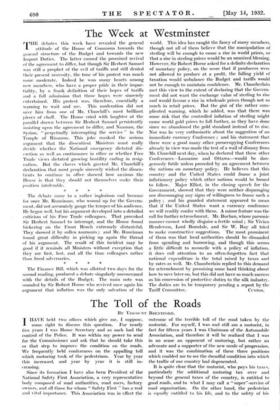The Week at Westminster
f 11HE debates this week have revealed the general
attitude of the House of Commons towards the general structure of the Budget and towards the new Import Duties. The latter caused the promised revival or the agreement to differ, but though Sir Herbert Samuel was still a prophet of the evil of tariffs and still denied their present necessity, the tone of his protest was much more .moderate. Indeed he won . many hearts among new members, who have a proper pride in their impar- tiality, by a frank definition of their hopes of tariffs and a full admission that those hopes were sincerely entertained. His protest was, therefore, essentially a warning to wait and see. This moderation did not save him from one of Mr. Churchill's most brilliant pieces of chaff. The House cried with laughter at the parallel drawn between Sir Herbert Samuel persistently insisting upon the agreement to differ, and Naaman, the Syrian, " perpetually interrupting the service " in the Temple of Rimmon. This joke masked the serious argument that the dissentient Ministers must really decide whether the National emergency dictated dis- cretion as well as continuance in office or whether Free Trade views dictated growing hostility ending in resig- nation. But the cheers which greeted Mr. Churchill's declaration that most people sincerely wished the dissen- tients to continue in office showed how anxious the House is that they should not themselves make their position intolerable.
* * *
The debate came to a rather inglorious end because for once Mr. Runeiman, who wound up for the Govern- ment, did not accurately gauge the temper of his audience. He began well, but his argument developed into a detailed criticism of his Free Trade colleagues. That provoked Sir Herbert Samuel to interrupt, and the House found bickering on the Front Bench extremely distasteful. They showed it by sullen murmurs ; and Mr. Runeiman found great difficulty in picking up again the thread of his argument. The result of this incident may be good if it reminds all Ministers without exception that they are first, last, and all the time colleagues rather than fiscal adversaries.
* * * * The Finance Bill, which was allotted two days for the second reading, produced a. debate singularly unconcerned with the details of the Budget. The main note was sounded by Sir Robert Honm who revived once again his argument that inflation was the only salvation of the world. This idea has caught the fancy of many members, though not all of them believe that the manipulation of sterling will be enough to cause a rise in world prices, or that a rise in sterling prices would be an unmixed blessing„ However, Sir Robert Horne asked for a definite declaration of monetary policy, on the score that if producers were not allowed to produce at a profit, the falling yield of taxation would unbalance the Budget and tariffs would not be enough to maintain confidence. Mr. Chamberlain met this view to the extent of declaring that the Govern- ment did not want the exchange value of sterling to rise and would favour a rise in wholesale prices though not so much in retail prices. But the gist of the rather com- plicated warning, which he added, was that there was some risk that the controlled inflation of sterling might cause world gold prices to fall further, as they, have done since we abandoned the gold standard instead of to rise. Nor was he very enthusiastic about the suggestion of an immediate currency Conference ; and his statement that there were a good many other preoccupying Conferences already in view was made the test of a wail of dismay from Mr. Churchill next day, when he declared that these other Conferences—Lausanne and Ottawa—would be dan- gerously futile unless preceded by an agreement between the nations on monetary policy. He believes that this country and the United States could frame a joint inflationary policy which other nations would be bound to follow. Major Elliot, in the closing speech for the Government, showed that they were neither disparaging nor discouraging any signs of willingness to frame such a policy; and his guarded statement appeared to mean that if the United States want a currency conference we will readily confer with them. A minor feature was the call for further retrenchment. Mr. Buchan, whose parsonie manner cannot wholly disguise a fertile mind ; Sir Vivian Henderson, Lord Borodale, and Sir W. Ray all tried to make constructive suggestions. The most prominent of them was that local authorities should be dissuaded from spending and borrowing; and though this seems a little difficult to reconcile with a policy of inflation, it does call attention to an often-forgotten. fact that national expenditure is the total raised by taxes and by rates as well. Mr. Chamberlain replied to this demand for retrenchment by promising some hard thinking about how to save later on, but this did not have so much success as his concession of protective duties to the silk industry. The duties are to be temporary pending a report by the




































 Previous page
Previous page